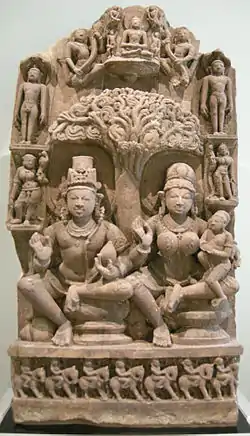夜叉
Chinese
| phonetic | |||
|---|---|---|---|
| simp. and trad. (夜叉) |
夜 | 叉 | |
Pronunciation
Noun
夜叉
Synonyms
- 藥叉/药叉
Derived terms
|
|
Descendants
Japanese

夜叉 (yasha): a male and female yaksha.
| Kanji in this term | |
|---|---|
| 夜 | 叉 |
| や Grade: 2 |
しゃ Jinmeiyō |
| on’yomi | |
Etymology
From Middle Chinese 夜叉 (yæH cha?), itself a transliteration of Sanskrit यक्ष (yakṣa).[1][2]
Noun
- yaksha, a broad class of nature spirits or minor deities who appear in Hindu, Buddhist, and Jain mythology. May be male or female, benevolent or malevolent.
- (Buddhism) in Buddhism, yakshas are held to be followers of 毘沙門天 (Bishamonten, “Vaiśravaṇa, the chief of the Four Heavenly Kings”), and guardians of the north
- (figurative) a demon
Idioms
Idioms
- 夜叉が馬を見たよう (yasha ga uma o mita yō): "like when the yaksha saw the horse" → an expression of extreme happiness, from a story of a yaksha who lost his horse
Synonyms
- 薬叉 (yakusha)
Derived terms
Derived terms
- 夜叉五倍子 (yashabushi): Alnus firma, a type of alder tree
- 夜叉竹 (yashadake): Semiarundinaria yashadake, a type of bamboo
- 夜叉柄杓 (yashabishaku): Ribes ambiguum, a type of flowering plant related to currants and gooseberry
- 夜叉薇 (yashazenmai): Osmunda lancea, the Japanese lancea flowering fern
This article is issued from Wiktionary. The text is licensed under Creative Commons - Attribution - Sharealike. Additional terms may apply for the media files.